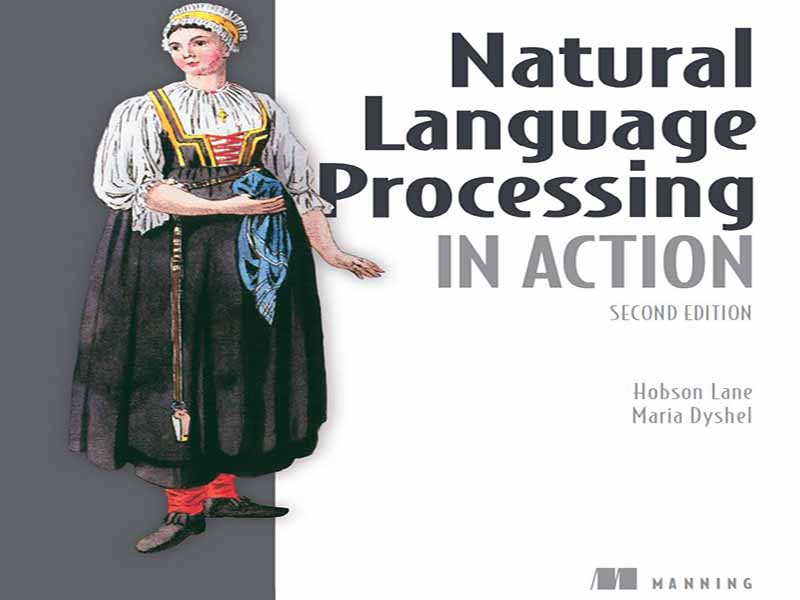- عنوان کتاب: Natural Language Processing in Action, Second Edition
- نویسنده: HOBSON LANE
- حوزه: پردازش زبان طبیعی
- سال انتشار: 2025
- تعداد صفحه: 720
- زبان اصلی: انگلیسی
- نوع فایل: pdf
- حجم فایل: 11.33 مگابایت
از نسخه اول، چیزهای زیادی در دنیای NLP تغییر کرده است. احتمالاً نمیتوانید انتشار BERT، GPT-3، Llama 3 و موج شور و شوق را برای مدلهای بزرگتر زبان، مانند ChatGPT، از دست بدهید. بهطور دقیقتر، در حین بررسی نسخه اول این کتاب در باشگاه کتاب گروهی یادگیری ماشینی سن دیگو (https://github.com/SanDiegoMachineLearning/bookclub)، ما در حالی که PyTorch (https://github.com/pytorch/pytorch) و spaCy (https://spacy.io/) بزرگترین کار در زمینه فناوری NR را مشاهده کردیم. شرکت ها و در چند سال گذشته شاهد ظهور Phind، You.com، Papers With Code (http://paperswithcode.com؛ Meta AI Research مخزنی از مقالات یادگیری ماشین، کد، مجموعه دادهها و تابلوهای امتیازات است)، Wayback Machine (http://archive در غیر این صورت)، arXiv.org (http://arxiv.org؛ دانشگاه کورنل، arXiv را برای محققان مستقل برای انتشار تحقیقات آکادمیک پیش از انتشار) و بسیاری از موتورهای جستجوی کوچکتر که توسط الگوریتمهای NLP prosocial ارائه میشوند، حفظ میکند. علاوه بر این، پایگاههای داده جستجوی برداری زمانی که اولین نسخه را نوشتیم، محصولی خاص بودند، در حالی که اکنون، آنها سنگ بنای اکثر برنامههای NLP هستند. با این گسترش و بازسازی جعبه ابزار NLP، فرصت های انفجاری برای استفاده از NLP به نفع جامعه به وجود آمده است. الگوریتمهای NLP در فرآیندهای کسبوکار اصلی فناوریهای بزرگ، استارتآپها و کسبوکارهای کوچک به طور یکسان عجین شدهاند. خوشبختانه برای شما، فناوریهای بزرگ بهطور نزدیکبینانه روی حفر خندقهای عمیقتر در اطراف انحصارات خود متمرکز شدهاند، یک فرآیند تجاری به نام enshittification. این نزدیک بینی فرصت سبزی را برای شما ایجاد کرده است تا NLP مبتنی بر کاربر و اجتماعی بسازید که می تواند با الگوریتم های NLP تخیلی فناوری های بزرگ رقابت کند. مدلهای کسبوکار بهینهسازی شده برای ایجاد انحصار چنان کاربران و تنظیمکنندگان، مدیران تجاری و مهندسان را مجذوب خود کردهاند که اکثر آنها نسبت به کاهش سودآوری این مدلهای کسبوکار کور هستند. اگر یاد بگیرید که چگونه سیستم های NLP بسازید که نیازهای شما را برآورده کند، در ساختن دنیایی بهتر برای همه سهیم خواهید بود. رشد کنترل نشده در قدرت الگوریتمها برای دگرگونی جامعه برای کسانی که میتوانند از حباب اطلاعاتی که این الگوریتمها ما را در آن گرفتار میکنند فرار کنند، آشکار است. فروپاشی اتحادیه اروپا، شورش در ایالات متحده، و اعتیاد جهانی به دکمههای لایک، همگی توسط افرادی تقویت میشوند که از پردازش زبان طبیعی برای انتشار اطلاعات نادرست و سرکوب صداهای معتبر استفاده میکنند. در کتاب استوارت راسل، هوش مصنوعی سازگار با انسان (کتابهای پنگوئن، 2020)، او تخمین میزند که از حدود 100000 محققی که بر پیشرفت قدرت هوش مصنوعی متمرکز شدهاند، تنها حدود 20 نفر بر تلاش برای محافظت از بشریت در برابر هوش مصنوعی قدرتمندی متمرکز هستند که به سرعت در حال ظهور است. و حتی تراژدی های اجتماعی دهه گذشته برای بیدار کردن آگاهی جمعی محققان هوش مصنوعی کافی نبوده است. این ممکن است به دلیل رسانههای اجتماعی و ابزارهای بازیابی اطلاعات باشد که ما را از این حقیقت ناخوشایند دور نگه میدارند که فناوری ما در حال پیشرفت است، جامعه را در یک خلسه جمعی قرار میدهد. به عنوان مثال، مصاحبهها و سخنرانیهای راسل در مورد هوش مصنوعی مفید معمولاً کمتر از 20 لایک در سال در YouTube و X (توئیتر سابق) به دست میآورد، در حالی که ویدیوهای قابل مقایسه توسط محققان هوش مصنوعی gung-ho هزاران لایک به دست میآورد. اکثر محققان هوش مصنوعی و عموم مردم به ظاهر از الگوریتم هایی که دسترسی آنها به اطلاعات واقعی و ایده های عمیق را از بین می برند، بی اطلاع هستند. بنابراین، این ویرایش دوم یک فراخوان سختگیرانهتر برای مهندسان نوپا است که هنوز توسط الگوریتمها دستگیر نشدهاند. ما کم، ما چند نفر خوشحالیم. امید ما به آینده توسط دو چیز تقویت می شود: یک ایده و یک مهارت. ایده این است که ما می توانیم با آن دسته از مشاغل و افرادی که آگاهی جمعی را تنزل می دهند با NLP رقابت کنیم. شما فقط باید به عادات ابرهمکاری که والدین و معلمانتان به شما یاد داده اند ایمان داشته باشید. شما می توانید آن عادات و غرایز قدرتمند را به الگوریتم های NLP که می سازید منتقل کنید. دومین رکن امید ما مهارت شماست. تخصص در NLP که از این کتاب به دست میآورید، تضمین میکند که میتوانید با محافظت از خود و اطرافیانتان در برابر دستکاری و اجبار، این غریزه اجتماعی را حفظ کنید. امیدواریم که بسیاری از شما بر اساس این ایده با جعبه ابزار مهارت های NLP خود به موفقیت تجاری چشمگیری دست پیدا کنید. شما برنامه نویسی خواهید کرد و در مقابل برنامه ریزی شدن مقاومت خواهید کرد. برای این ویرایش دوم، ما یک نویسنده اصلی جدید داریم که دیدگاهی تازه و تجربه زیادی در تأثیر الگوریتمهای اجتماعی به ارمغان میآورد. ماریا دیشل و من در کتابخانه Geisel نشسته بودیم و با همکارهای خود در سن دیگان در یک جلسه گروه کاربران پایتون همکاری می کردیم که متوجه شدیم ماموریت مشابهی داریم. ماریا به تازگی هوش مصنوعی ملموس را تاسیس کرده بود تا از آن استفاده کند…
A lot has changed in the world of NLP since the first edition. You probably couldn‘t miss the release of BERT, GPT-3, Llama 3, and the wave of enthusiasm for ever larger large language models, such as ChatGPT. More subtly, while reviewing the first edition of this book at the San Diego Machine Learning group book club (https://github.com/SanDiegoMachineLearning/bookclub), we watched while PyTorch (https://github.com/pytorch/pytorch) and spaCy (https:// spacy.io/) rose to prominence as the workhorses of NLP at even the biggest of big tech corporations. And the past few years have seen the rise of Phind, You.com, Papers With Code (http://paperswithcode.com; Meta AI Research maintains a repository of machine learning papers, code, datasets, and leaderboards), Wayback Machine (http://archive .today; The Internet Archive maintains the Wayback Machine, which houses petabytes of cached natural language content from web pages you wouldn‘t have access to otherwise), arXiv.org (http://arxiv.org; Cornell University maintains arXiv for independent researchers to release prepublication academic research), and many smaller search engines powered by prosocial NLP algorithms. In addition, vector search databases were a niche product when we wrote the first edition, while now, they are the cornerstone of most NLP applications. With this expansion and retooling of the NLP toolbox has come an explosion of opportunities for applying NLP to benefit society. NLP algorithms have become ingrained in the core business processes of big tech, startups, and small businesses alike. Luckily for you, big tech has myopically focused on digging deeper moats around their monopolies, a business process called enshittification. This nearsightedness has left a green field of opportunity for you to build user-focused, prosocial NLP that can outcompete the enshittified NLP algorithms of big tech. Business models optimized for monopoly building have so thoroughly captivated users and captured regulators, business executives, and engineers that most are blind to the decline in profitability of those business models. If you learn how to build NLP systems that serve your needs, you will contribute to building a better world for everyone. The unchecked growth in the power of algorithms to transform society is apparent to those able to escape the information bubble these algorithms capture us in. Authoritarian governments and tech businesses, both large and small, have utilized NLP algorithms to dramatically shift our collective will and values. The breakup of the EU, the insurrection in the US, and the global addiction to Like buttons are all being fueled by people employing natural language processing to propagate misinformation and suppress authentic voices. In Stuart Russell’s book, Human-Compatible AI (Penguin Books, 2020), he estimates that out of approximately 100,000 researchers focused on advancing the power of AI, only about 20 are focused on trying to protect humanity from the powerful AI that is rapidly emerging. And even the social tragedies of the past decade have been insufficient to wake up the collective consciousness of AI researchers. This may be due to social media and information retrieval tools insulating us from the inconvenient truth that the technology we are advancing is putting society into a collective trance. For example, Russell’s interviews and lectures on beneficial AI typically garner fewer than 20 likes per year on YouTube and X (formerly Twitter), whereas comparable videos by gung-ho AI researchers garner thousands of likes. Most AI researchers and the general public are seemingly ignorant of the algorithms chipping away at their access to truthful information and profound ideas. So this second edition is a more strident call to arms for budding engineers not yet captured by algorithms. We few, we happy few. Our hope for the future is powered by two things: an idea and a skill. The idea is that we can out-compete those businesses and individuals that degrade the collective consciousness with NLP. You only need put your faith in the supercooperator habits your parents and teachers taught you. You can pass along those powerful habits and instincts to the NLP algorithms you build. The second pillar of our hope is your skill. The expertise in NLP that you will gain from this book will ensure you can maintain that prosocial instinct by protecting yourself and those around you from manipulation and coercion. Hopefully, many of you will even achieve dramatic commercial success building on this idea with your toolbox of NLP skills. You will program and resist being programmed. For this second edition, we have a new lead author, bringing a fresh perspective and a wealth of experience in the impact of prosocial algorithms. Maria Dyshel and I were sitting in Geisel Library collaborating with our fellow San Diegans at a Python User Group meetup when we realized we had the same mission. Maria had just founded Tangible AI to harness the power of NLP for the social sector, and I was working with San Diego Machine Learning (SDML) friends to build a cognitive assistant called qary. She immediately saw how qary and the tools you’ll learn about here are such powerful forces for good. In the rest of this book, she and I will show you how NLP can be used to help nonprofits and social-impact businesses in ways I’d never considered before that fateful encounter. You’ll find many new success stories of prosocial NLP in the real world within these pages. She’s teaching me conversation design (and appropriate emoji use). I’m teaching her how to build dialog engines and information retrieval systems. And we’re both showing businesses and nonprofits (and you) how to harness these tools for good. From authentic information retrieval and misinformation filtering to emotional support and companionship, chatbots and NLP may just save society from itself.
این کتاب را میتوانید از لینک زیر بصورت رایگان دانلود کنید:
Download: Natural Language Processing in Action, Second Edition



































نظرات کاربران